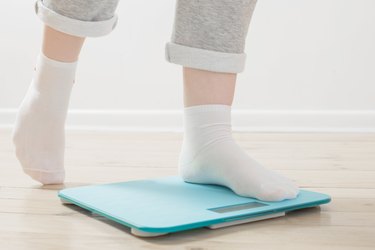
There are several reasons for weight gain when starting an exercise program. Your body goes through a transition period that can initially lead to a higher number on the scale due to water weight. This is only temporary, so you can continue to work out to get leaner and build lean mass.
Gaining Weight Despite Working Out?
Video of the Day
If you're training for a marathon or taking spin classes and find that the scale is going the wrong direction, know that you're not alone. Weight gain when starting an exercise program is not uncommon, and there are several reasons why this is happening.
Video of the Day
First of all, don't let this temporary setback prevent you from continuing to exercise. When you start a new fitness program, your muscles get small micro-tears that result in some inflammation, notes the Cleveland Clinic.
Your body responds to these micro-tears and inflammation by retaining fluid. This effect is temporary, though. Allow your body to rest until most of the muscle soreness subsides, which is often around 24 to 36 hours.
Another reason you could be having weight gain when starting an exercise program is from the process your body uses to send energy to your muscles, says the Cleveland Clinic. Your body stores more glycogen, or sugar, to fuel your muscles when you exercise, so when you first start working out, it starts storing extra glycogen. This compound binds to water, which can contribute to fluid retention.
The good news is that the more you exercise, the more efficient your muscles become and the less glycogen they need, which means less water weight gain. Expect to lose 1 to 3 pounds of water weight in a few weeks or a month after starting an exercise program.
Read more: How to Shed Water Weight
Strength Training and Weight Gain
Two people can weigh the same but look much different if one person has more lean muscle mass and the other person has more adipose tissue. If you are doing a weight lifting routine, know that strength training and weight gain are connected. However, you're most likely gaining lean mass, not fat (assuming that your diet is in check).
Under these conditions, it would take you at least a month or two to add enough lean muscle mass to show up on your scale, says the Cleveland Clinic. By that time, you should have also lost some fat through the added exercise.
If you keep gaining weight despite working out, you may need to look at your calorie intake. Just because you're exercising more doesn't mean you can eat all you want and expect to lose weight.
Generally, it's necessary to burn 3,500 calories to lose one pound of fat, states the Mayo Clinic. If you cut 500 calories a day from your diet and also exercise, you can safely lose 1 to 2 pounds a week. If you don't cut calories but exercise more, you will still lose weight, just at a slower rate. On the flip side, if you exercise but consume more calories than you burn, you may end up gaining weight.
Read more: Do You Gain More Weight When Lifting Weights?
Measuring Body Fat Percentage
Doctors will often look at your body mass index (BMI) and body fat percentage to assess your overall health. BMI is a number based on a formula combining weight and height and, according to the Centers for Disease Control and Prevention, helps determine if someone has underweight, normal weight, overweight or obesity. You can check out their BMI Calculator to determine your number and results.
BMI isn't always an accurate prediction of weight, especially in athletes. Many times, they have a high BMI number because they weigh more due to being muscular, not fat.
This is why knowing your body fat percentage can be helpful. According to the American Council on Exercise, the skinfold measurement technique is a good way to measure body fat composition. A device called a caliper is used to measure the thickness of your skinfolds in specific points.
To decrease your body fat percentage, make sure you do cardiovascular exercise and resistance training to build lean mass (which burns more calories at rest!). What you eat is just as important.
If you're feeling frustrated because you are exercising and gaining weight, stay off the scale for a couple of weeks and instead look at how your clothing fits. Are you now able to zip up your skinny jeans? Are your dresses and shirts baggier than before? Are your legs looking more toned? These small things can reveal whether you're gaining fat or lean mass.
- Cleveland Clinic: "I Just Started Exercising — Why Am I Gaining Weight?"
- Mayo Clinic: "Counting Calories: Get Back to Weight-Loss Basics"
- Centers for Disease Control and Prevention: "About Adult BMI"
- Centers for Disease Control and Prevention: "Adult BMI Calculator"
- American Council on Exercise: "Percent Body Fat Calculator: Skinfold Method"
Was this article helpful?
150 Characters Max
0/150
Thank you for sharing!
Thank you for your feedback!